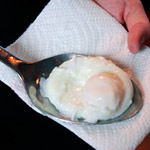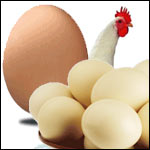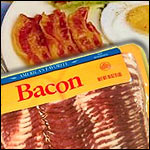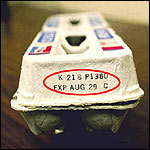Breakfast Articles > Ask Mr Breakfast
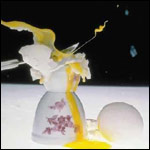

|
Dear Mr Breakfast,
How do you boil an egg?
- Julie B.
|
 Great question Julie!
Great question Julie!I refer to boiled eggs as "flash-boiled-then-simmered eggs". I wasn't sure if you meant "soft-flash-boiled-then-simmered eggs" or "hard" so I cooked up a response for both.

The following instructions are for large eggs.
HARD-BOILED


Note: Extremely fresh eggs are not recommended when making hard-boiled eggs. They are very difficult to peel. This is the best use for eggs nearing their expiration date.
- Remove desired number of eggs from the refrigerator and let them sit at room temperature for 15 minutes.
- Place eggs in a small sauce pan and add just enough water to completely cover eggs. (Note: the smaller the pan; the less room the eggs have to jump around and crack into each other).
- Bring the water to a rolling boil. Covering the pan will lead to a quicker boil and is recommended.
- Immediately reduce heat to simmer and remove the cover from the pan.
- Let the eggs sit in the simmering water for 12 minutes. (11 minutes for medium eggs; 13 minutes extra-large eggs)
- Carefully remove the pan from the stove top and place beneath the kitchen faucet. Run cool water into the pan for a minute until the water is cool to the touch. Give each egg a little whack to the side of the pan, so each egg has one or two cracks. Some will tell you that this lets pent-up sulphur escape. More practically, this allows a little steam to build between the cooked egg and its shell to make peeling easier. Let the eggs sit in the cool water for 2 to 5 minutes.
- To peel the Mr Breakfast way: Place hard-boiled egg on a hard surface such as a cutting board. Roll the egg back and forth - applying a very slight amount of pressure. Remove the cracked shell beneath a faucet of cool running water.
- If peeling multiple eggs, place peeled eggs in a bowl of cold water while you work the others. Refrigerating peeled eggs is not recommended. Hard-boiled eggs - still in their shell - can be stored in a refrigerator for 5 days.
SOFT-BOILED


- Remove desired number of eggs from the refrigerator and let them sit at room temperature for 15 minutes.
- Place eggs in a small sauce pan and add just enough water to completely cover eggs.
- Bring the water to a rolling boil. Covering the pan will lead to a quicker boil and is recommended.
- Immediately reduce heat to simmer and remove the cover from the pan.
- The amount of time the eggs are allowed to simmer will determine the degree to which the yolk is cooked. A cooking time of less than 4 minutes is not recommended.
Soft-cooked runny yolk:
5 minutes (4 minutes for medium eggs; 6 minutes for extra-large eggs)
Medium-cooked creamy partially-firm yolk:
7 minutes (6 minutes for medium eggs; 8 minutes for extra-large eggs)
- Carefully remove the pan from the stove top and place beneath the kitchen faucet. Run cool water into the pan for a minute until the water is cool to the touch. This reduces the temperature enough so the eggs won't continue to cook under their own internal heat. It also brings them down to a more appropriate serving temperature.
- To serve soft-boiled and medium-boiled eggs: Place cooked egg in an egg cup. Small cappuccino cups work in a fix. Crack with a small spoon and consume directly from the shell.
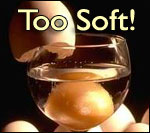
What's The Deal With Pin Pricks?
I've seen it suggested that piercing the wide end of an egg - before cooking - with a needle or pin helps air (and to a degree sulfur) escape from the cooking egg. This is supposed to result in a perfectly oval egg without a flat bottom as the egg can spread to the small air pocket at the end of the egg.
In actual practice, piercing the shell of an egg is tricky business that often results in a cracked egg. If you are successful in piercing all of your eggs, the difference in taste and appearance is negligible.
Quick & Dirty Method Of Hard-Boiling
When Mr Breakfast was in college, a vibrant yellow yolk wasn't nearly as important to him as chasing skirts and getting stoned on beer. I - me being him - would simply bring water to a boil, place my eggs in the water and remove them all when the first crack appeared in any one of the eggs. The eggs would naturally be slightly over-cooked. But the negative effect of slight-overcooking was one of appearance. The yolk was more of an off-yellow, just-short-of-green color. The eggs still tasted great.
What's Up With Green Yolks? Is That Bad?
A greenish grey film will form on the surface of the yolk when the temperature of the yolk exceeds 158 degrees Fahrenheit. This discoloration is not unhealthful. It's just a visual indicator of a natural chemical reaction... hydrogen sulphide from amino acids in the white of your egg (or albumen) is reacting with iron from the yolk which causes a film of ferrous sulphide to form on the yolk's surface. If the film is thin, your egg will still taste fine.
My Friend Likes 3-Minute Eggs. Is He Crazy?
Your friend might not be crazy, but he is a daredevil. I don't recommend ever simmering eggs for less than 4 minutes. The clearest indication that an egg has been cooked long enough - at a high enough temperature - to kill salmonella bacteria is a solidified egg white. At 3 minutes, portions of the egg white may still be clear - and as the poem goes: "Egg white clear! Food poison fear!" Stay away from your friend. He sounds like bad news.
Why Do You Say Fresh Eggs Are Harder To Peel Than Older Ones?
I'm not a scientist, in the pompous go-to-science-college sense of the word, but I have a theory. Egg shells are what those fancy scientists call "porous". Basically, that means it has tiny microscopic holes that allow the egg to absorb air. I believe that the air that enters the egg over time creates - what I call - "a little wall of air" between the egg and its shell. Super fresh eggs have hardly any little wall of air at all. Therefore, the egg is all smooshed up against the shell. In the end, it's like a shoe. A tight shoe is hard to remove. A shoe with some room slips right off. Wow, maybe I am a scientist. Is there a test I can take?
I Have Something To Say About Boiled Eggs. What Do I Do?
Email Me!
This article was written by Mr Breakfast (aka Eddy Chavey).
More Answered Questions:
The editorial content above may not be reproduced without the written permission of
Home | About | Contact | Breakfast Recipes | The Cereal Project | Site Index | Food Charities | Blog
©2025 MrBreakfast.com
©2025 MrBreakfast.com


